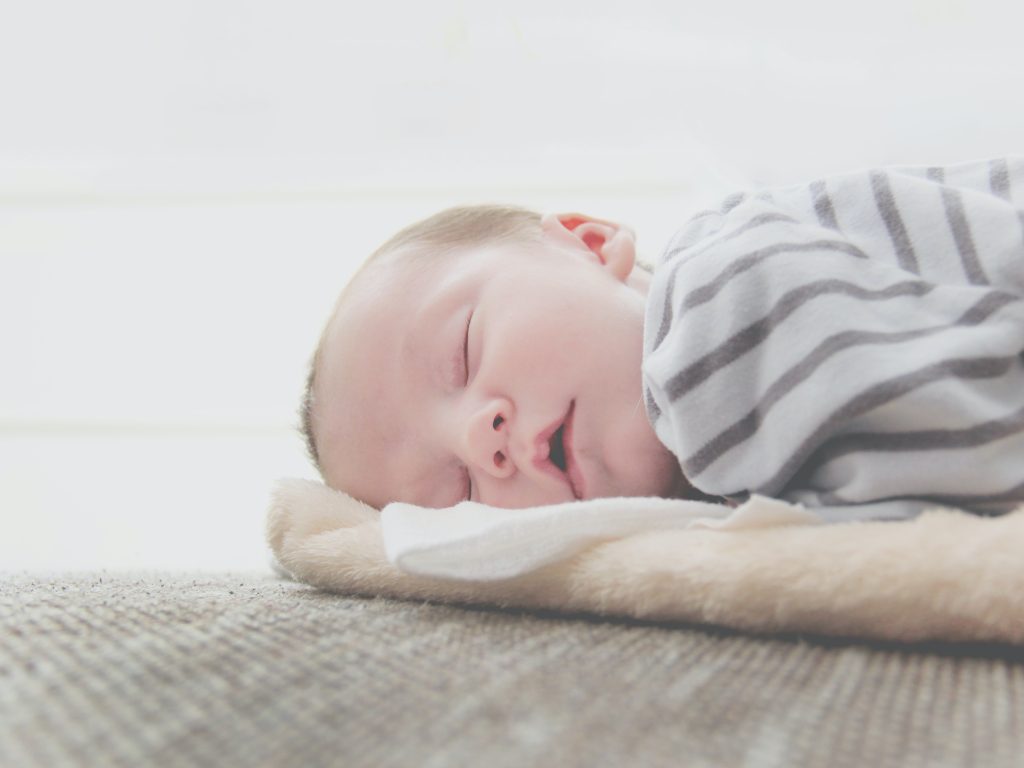Newborn tips for sleeping: a guide to safe parenting
Although sleep is such an important part of life, especially for a child, pediatricians often ignore sleep disturbances. Moreover, data derived from studies conclude that sleep problems in children are highly prevalent. Unfortunately, these rates range from 25% to 40%. This article considers behaviorally-based sleep disorders and outlines newborn tips for sleeping.
How Do You Get a Newborn to Sleep at Night?
Your baby needs to adjust to being born and you need to adjust to being a parent. You both need time to tune into your new lives. Some of the important factors to consider which help babies sleep better are discussed below-
Comfort and Safety
Ensure your baby is comfortable. This covers a wide range of factors that contributes to your baby’s comfort. For instance, check if your baby is well-fed and wearing a clean diaper. Ensure the baby is appropriately dressed- not wearing too many layers but just enough to keep your baby warm and cozy for the rest of the night.
Making sure your baby is comfortable also includes the baby’s sleep is dark and quiet. Go ahead and turn off the main lights and play some white noise or soft music. Light prevents the production of sleep-inducing hormones and white noise drowns any unnecessary chatter.
Swaddle Your Baby to Sleep
Swaddle your baby to sleep. Swaddling is perfect for babies and is the most basic way of getting them to sleep. Swaddling or rocking a baby to sleep makes them fall asleep faster and longer. There is a little science behind this- newborns are still developing control of their bodies. They involuntarily move their little arms and legs, which disrupts their sleep. Gentle swaddling induces comfort and safety in them; and also prevents them from moving their arms and legs unnecessarily.
The best way to swaddle your baby to sleep using a lightweight cotton blanket or are sleeping sack. This prevents the baby from overheating. However, be sure to not wrap the baby too tightly it might be uncomfortable for them. You should stop this method while your baby can roll over on their own, which is when they are about 2 months.
Stick to a Routine
Make a sleep routine and stick to it. Although you can expect your baby’s sleep schedule to be a mess for the first 16 weeks it is never too early or too late to develop a sleep routine. The routine should be relaxing and calm. Don’t know anything too active. The Final part of your routine should end in your baby’s sleep environment. This helps the baby associate with the bedroom she sleeps in. Bedtime routines can include soft cuddles, gentle massages, lullabies, etc.
Reserve All the Attention for the Morning
Give your baby enough attention during the day. Such as, softly talking to your child, playing with your baby, cuddling them, or showing any other forms of love. However, try not to do these activities at night. This may disrupt their ‘sleepiness’. Keep the interactions with your child small and ‘boring’ at night. This gives your baby the idea that night is only for sleeping and no other activities thus helping them to sleep faster and better.
It same Time, Same Place
Put your child to sleep at the same place at the same time every night. New parents are often tired- they may fall asleep on the couch with the baby in their arms or leave the sleeping baby in her stroller. While this is not the worst idea but this effects adversely the child’s sleep routine.
Adjust as Necessary
Baby just doesn’t grow out of car seats and clothes, they also grow out of sleep routines. Initially, your newborn might fall asleep to a search in lullaby or snuggles, this will rapidly change as the baby keeps growing. You have to keep up with the change and opt for strategies that suit them better as they grow.
How Can I Get My Newborn to Sleep Faster?
Some easy and basic ways to help your baby sleep faster and better are:
- Gently massage your baby with oil.
- Change your baby’s clothes before hitting the bed.
- Give your baby a warm and short relaxing bath in the morning.
- Use a rocking chair to gently rock or sway your baby to sleep.
- Turn off lights; make the sleep space dark, well-ventilated, and quiet.
- Play soft music or have white noise in the background to drown any noise that may disrupt your baby.
- Hum any lullaby or softly sing nursery rhymes.
- Gently talk to your baby in a relaxing voice, reassuring your presence; this induces calmness and safety in your baby.
- Ensure your baby is well fed and the sleeping surface is dry, firm, comfortable, and adequately spacious.
What Causes Sleepless Nights in Newborns?
Long story short, sleeplessness or nighttime disruption is very common and a part of new parenthood. A few factors that may contribute to this aspect are temporary things like-
- Teething
- Changes in routine
- Change in sleeping space
- Illness
- Growth
- Developmental milestones
- Hunger or discomfort
What to do if My Newborn is Not Sleeping?
There are a couple of things to do and look out for if your newborn is having trouble sleeping at night. Some sleeping tips for newborns are outlined below:
- Make sure your baby gets enough sunlight while being well protected, of course. Natural light has vitamin D, and it also helps to reset the internal body clock of a baby. Hence proper and adequate exposure to sunlight can improve your baby’s overall health and sleep schedule.
- If you are baby is sucking his or her finger, it’s a sign that the baby is hungry. Try feeding him, while gently and rhythmically patting the baby; this may put him to sleep.
- Even though baby brains do not comprehend conversation, try talking to him in a gentle slow voice; as if you are conversing meaningfully with an adult. This induces calmness in the baby, makes them feel understood, and is often helpful to take their edge off restlessness and put them to sleep.
- If your baby is not hungry but is just being a little finicky, try taking him onto your shoulder and walking around for a bit. Gently swaddle, and do not rock the baby vigorously. This not only has health adverse effects in the future, like brain damage but also sometimes induces panic in them. Gentle swaddling or rhythmic walking is one of the most common and basic ways to put a baby to sleep.
- Make sure the baby’s room is airy and the bed is not too congested. Avoid putting too many things on the baby’s bed. This may include stuffed animals or even too many pillows. Babies, too, like to have their sense of space while sleeping.
- Your baby’s sleeping surface should be firm and cozy. Avoid using soft bedding; do not put baby blankets or a soft mattress under the bed sheet. Babies have delicate and flexible airways which can be affected if they rest on too soft of a surface.
Sleep Safety for Newborns
Expected parents sometimes get too excited about painting and decorating their nursery. They go from setting a theme to hanging flashy wall hangers and putting cute bed covers. While that is not wrong, a baby wants the room to be dull dark, and safe.
Dull: As sad as it sounds, a baby’s room should be dull. This is because blinking lights or flashy wall hangings can distract the baby while you are trying to put her to sleep. Anything that you cannot categorize as dull, including a toy that lights up or is noisy, acts ineffective to your baby’s sleep schedule.
Dark: Although natural light helps with the body’s sleep clock, the room your baby sleeping at night should be dark. Contrarily, light reduces the production of sleep-inducing hormones. You can have a dim light on if you are afraid to be in absolute darkness, but the ideal sleep space for your baby should be dark.
Safe: Above all, your baby needs to know that she is safe. If your newborn is sleeping better with you by their side, stay skin-to-skin contact with them for as long as they need. More importantly, remove any potential cause of injury there is in the room. Baby-proof your room as much as you can.
FAQ
What is the fastest way to get my newborn baby to sleep?
Light, gentle, repetitive movements like swaying or rocking often work miracles while putting babies to sleep. Playing soft music with dimmed lights also helps babies sleep faster and better.
Why does my baby not want to sleep?
Babies often fight sleep for several reasons, including mild sickness, hunger, discomfort, separation anxiety, overtiredness, etc.
How do I calm my baby to sleep?
Gently rub on your newborn’s back, and try swaddling them with relaxing soft music in the background. Hold your baby close to you and try gently repeating such movements.
Conclusion
The most challenging part of being a new parent is putting your baby to sleep. Luckily, we present a few tips and methods that help you settle in your baby for the night. Babyproofing the room, creating the safest environment, gentle swaddling, and proper bedtime routine is often the best and easiest ways to curl up with your baby and call it a night.

Frank Matthew is an accomplished professional with a background in pediatrics, research, and writing. He began his career as a pediatrician and gained invaluable experience in caring for children, managing illnesses, and ensuring their overall wellbeing. After several years of practicing medicine, Frank shifted his focus to research and investigation in the fields of baby products, child safety, and child development. His passion for improving the lives of children through knowledge and understanding of these critical areas led him to become a leading expert in the field.
Today, Frank is a full-time author and blogger of the website Babyfifi.com, where he shares his expertise and insights with parents, caregivers, and professionals around the world. His extensive knowledge, combined with his exceptional writing skills, make him a sought-after resource for anyone seeking information on child development, parenting, and child safety. Frank’s dedication to improving the lives of children and their families is evident in everything he does, and his contributions to the field of pediatrics continue to make a significant impact.


